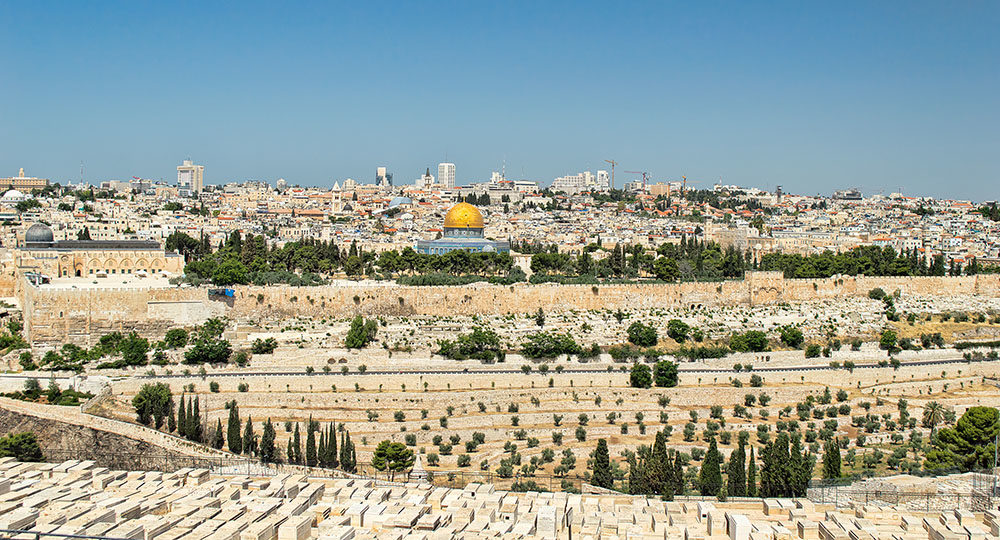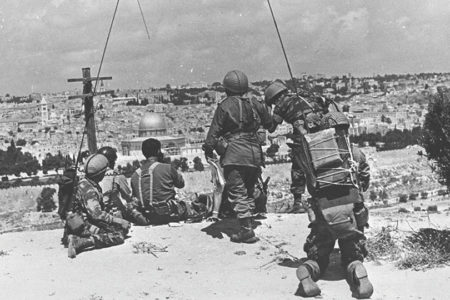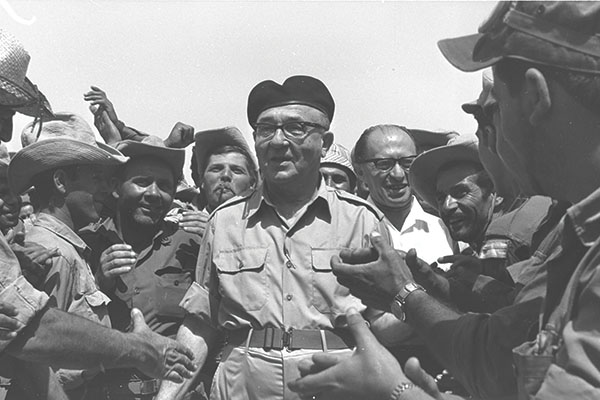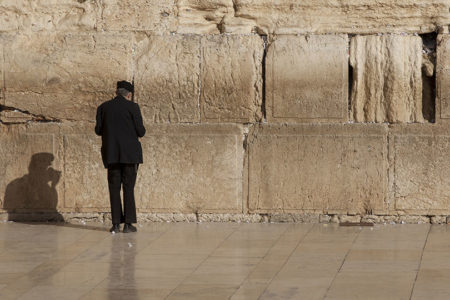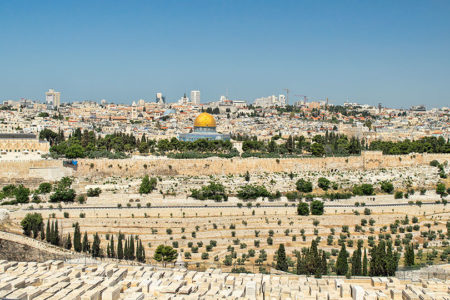The Future of Jerusalem
The future of the city of Jerusalem is of vital concern to the three main monotheistic religions of the world—Judaism, Christianity, and Islam. Each has an historical claim to and a compelling interest in this city.
The present-day Middle East conflict between Israel and the Arab nations is primarily a religious problem. The United States has taken the lead in applying increasing pressure on the people of this region, especially Israel, to negotiate a peace settlement; however, no political settlement will establish a lasting peace.
Jerusalem is the heart of the problem. Although it has not yet been addressed in the current peace talks, it most assuredly will be in the days that lie ahead. The future of Jerusalem is the bottom-line issue between Israel and the Arab nations.
“This is Jerusalem; I have set her in the midst of the nations and countries that are round about her” (Ezek. 5:5). Spoken by God and penned by the Prophet Ezekiel, this verse indicates that Jerusalem is like a magnet that will ultimately attract all the nations of the world to her. This is exactly what the Bible says will happen in the last days of human history as we know it. It is very possible that we are living at the beginning of the fulfillment of that scenario. What does the Bible predict for the city of Jerusalem in the future? The answer to this question is important because it will likely impact our future as well.
Pray for Jerusalem
“Pray for the peace of Jerusalem” (Ps. 122:6). This command is incumbent on all believers. “Ye that make mention of the Lᴏʀᴅ, keep not silence, And give him [God] no rest, till he establish, and till he make Jerusalem a praise in the earth” (Isa. 62:6–7). We are to pray continually that God will bring peace to the city of Jerusalem. When that occurs, the entire earth will experience peace.
Two thoughts are contained in the beginning phrase of Psalm 122:6. They summarize not only the history of Jerusalem but also her future. The command to pray for peace implies:
- The Lack of Peace. This has been the history of Jerusalem. She has known more wars than any other city in the world. The future, at least in the short term, will be no different.
- The Future Establishment of Peace. God has asked us to pray for the peace of Jerusalem, and many have done so. One day He will answer our prayers and provide peace for that city.
The Conflict
The present conflict in the Middle East centers on Jerusalem. This understanding is captured very well in a statement made by David Dolan in his excellent book, Holy War for the Promised Land: “Indeed, the struggle for control of the Temple Mount and the rest of the Old City [Jerusalem] is the central point of contention in the Arab/Israeli conflict—a fact often obscured in the day-to-day media coverage of the latest happenings in the conflict.”
The Koran teaches that Islam is to reign supreme over all. It encourages Muslims to make war on unbelievers until Allah reigns supreme (Sura 8:39). Arabist S. D. Goiten says, “Islam is a militant religion, which makes perpetual war incumbent on the Muslim community until the whole world is subjected to its rule.”
Religion is the supreme issue in the Middle East. With this in mind, let us briefly examine what the Bible teaches concerning the future of the city of Jerusalem.
Covenant of Peace
Daniel tells us that one day a temporary peace will come to the Middle East (Dan. 9:27). It is possible that Jerusalem will play an important role in this seven-year peace agreement because Daniel’s entire prophecy (vv. 24–27) is tied to Jerusalem and the Jewish people (v. 24).
Will the present talks between Israel and the Arabs fulfill Daniel’s prophecy? As things stand today, probably not. The Bible teaches that the Antichrist will establish the seven-year peace agreement. He will be a political leader from the revived Roman Empire, probably Europe. If the current talks are to lead to the peace covenant of Daniel 9:27, we must look for a European leader to emerge with a solution to the Israeli/Palestinian/Arab problem. Perhaps the solution will revolve around the status of the Temple Mount and Jerusalem. This covenant will not produce lasting peace for the city of Jerusalem. Rather, the peace will be tenuous and short-lived.
Rebuilt Temple in Jerusalem
Daniel 9:27 and 2 Thessalonians 2:4 speak of a Temple in Jerusalem in the seven-year period of tribulation that lies ahead for the world. Perhaps the political leader, the Antichrist, will guarantee peace in the area and persuade the Jewish leaders in Israel to agree to his plans by promising to rebuild the Temple in Jerusalem.
Regardless of how it is done, the Temple will be rebuilt in Jerusalem and will be standing by the middle of the Tribulation. The sacrificial system, which has been nonexistent for almost two thousand years, will be reinstituted (Dan. 9:27). But the Antichrist will not allow the status quo to continue for long. Midway through the seven-year Tribulation period, he will enter the Temple in Jerusalem and proclaim himself to be God (2 Th. 2:3–4). This will usher in a period of extreme persecution against the Jewish people, which the Bible refers to as “the time of Jacob’s trouble” (Jer. 30:7). The short-lived peace in the city of peace will turn into conflict again.
Armageddon
What is usually referred to as the battle of Armageddon will most likely be a campaign or series of battles rather than one final, climactic battle. It is possible that this campaign will begin around the middle of the seven-year Tribulation period.
The covenant that the Antichrist will establish with Israel will bring temporary peace (Ezek. 38:8, 11), but that peace will be broken when the king of the north (probably Syria) and the king of the south (probably Egypt) initiate a war (Dan. 11:40–45), most likely against Israel. Having guaranteed peace for Israel, the Antichrist will fight against these countries, eventually overpowering them.
After overcoming the kings of the north and south, the Antichrist will hear rumblings “out of the east and out of the north” (Dan. 11:44). This may be the battle described in Ezekiel 38 and 39. The northern power has been identified as Russia, along with a number of other countries aligned with her (Ezek. 38:5–6). For a detailed treatment of this scenario, see The Most High God by Dr. Renald E. Showers.
It seems likely that following the defeat of Russia and her allies by God, the Antichrist will enter the Temple and proclaim himself to be God (Dan. 11:45; Rev. 13:4–6), perhaps even claiming that he was the one who destroyed Russia. The result of this will be a great conflict for the city of Jerusalem and her people (Mt. 24:15–21).
The Prophet Zechariah said that God “will gather all nations against Jerusalem to battle” (Zech. 14:2). Jerusalem will be the magnet attracting the nations to the final act of the Tribulation period. It is noteworthy that most of the countries mentioned in Daniel 11:40 and Ezekiel 38:5–6 are predominantly Muslim. Ezekiel 38:4 says that God will turn Russia back toward Israel by putting “hooks” into her “jaws.” Could the hooks be the influence of the Muslim world and their desire to control Jerusalem? A British intelligence report from 1990 said that this might be the case. It stated:
Nor will Islam draw back. That is why the Middle East is the crucial area. You can altogether exclude any lasting compromise between Islam and Zionism. You can also exclude any lasting joint deterrent policy between the Atlantic Powers and the USSR. No government in Moscow could survive it for 10 years. The Islamics of Russia would not allow it. In the Middle East itself no Arab Government could long survive refusal of Jerusalem to Islam and no Israeli Government could survive the surrender of Jerusalem. It is therefore on the platform of Palestine and at the gates of Jerusalem that the present epoch will face its ultimate drama.
The Coming of the Prince of Peace
Zechariah 12 gives a fascinating prophecy of the end of the last conflict of Armageddon. It states that Jerusalem will become “a burdensome stone for all peoples” (v. 3). Interestingly, even the West Bank (Judah) is mentioned as problematic for the peoples of the world (v. 2). This portion of Scripture accurately describes the situation in the world today.
God will bring all the nations of the world to Jerusalem to accomplish His purpose and plan. Those nations will be destroyed by the Lord during this final climactic battle (Zech. 14:2; 12:8–9).
When the Lord fights for the nation of Israel at that time, the Jewish people will finally recognize that He is Jesus, their Messiah. Zechariah 12:10 states, “and they shall look upon me whom they have pierced, and they shall mourn for him.” Deliverance from destruction by the nations of the world should produce jubilation. But their recognition of Jesus as the God of Israel, the one pierced and rejected (Isa. 53), will turn a joyous time into a time of deep sorrow and repentance. Israel will then receive its Messiah.
The Peace of Jerusalem
Zechariah 12:10 also says “I will pour upon the house of David, and upon the inhabitants of Jerusalem, the Spirit of grace and of supplications.” Supplications are requests or prayers. The prayers in view here must be those that have been offered in obedience to Psalm 122:6.
Peace will come to Jerusalem—and the world—only when Jesus returns. The passage in Zechariah describes His coming and the answer to our prayers for peace. Jerusalem will then be established as the center of the world, and the Kingdom of the Messiah will be established on the earth. The Temple will be rebuilt by the Messiah (Zech. 6:12–13), suggesting that the Temple to be entered by the Antichrist will be destroyed sometime in the second half of the Tribulation period.
Jesus will reign on the earth for a thousand years (Rev. 20:6) with all of the saints of history. Jerusalem will be His place of dwelling and the city of the King. During the thousand years of peace, all nations will be required to go to Jerusalem annually to worship the Messiah (Zech. 14:16). Israel will then be the head of the nations, and Jerusalem will finally know peace after millennia of conflict.
Some have referred to Jerusalem’s history as one of tragedy and triumph. What an apt description. The biblical teaching of Jerusalem’s future in the short term is bleak indeed. More war and turmoil are inevitable. Her ultimate destiny, however, is secure. It rests in the hands of our sovereign God. Jerusalem will know peace for an extended time and triumph in the end.
The religions and politics of the world are on a collision course with God. Nothing can prevent it. But Jerusalem’s destiny is secure because of the Messiah. Have you accepted Jesus as your Messiah so that you can say that your destiny is secure?
